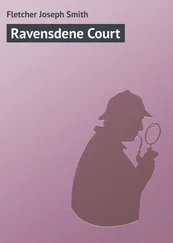Joseph Fletcher - In the Mayor's Parlour
Здесь есть возможность читать онлайн «Joseph Fletcher - In the Mayor's Parlour» — ознакомительный отрывок электронной книги совершенно бесплатно, а после прочтения отрывка купить полную версию. В некоторых случаях можно слушать аудио, скачать через торрент в формате fb2 и присутствует краткое содержание. Издательство: Иностранный паблик, Жанр: foreign_prose, Классический детектив, foreign_detective, foreign_antique, на английском языке. Описание произведения, (предисловие) а так же отзывы посетителей доступны на портале библиотеки ЛибКат.
- Название:In the Mayor's Parlour
- Автор:
- Издательство:Иностранный паблик
- Жанр:
- Год:неизвестен
- ISBN:нет данных
- Рейтинг книги:3 / 5. Голосов: 1
-
Избранное:Добавить в избранное
- Отзывы:
-
Ваша оценка:
- 60
- 1
- 2
- 3
- 4
- 5
In the Mayor's Parlour: краткое содержание, описание и аннотация
Предлагаем к чтению аннотацию, описание, краткое содержание или предисловие (зависит от того, что написал сам автор книги «In the Mayor's Parlour»). Если вы не нашли необходимую информацию о книге — напишите в комментариях, мы постараемся отыскать её.
In the Mayor's Parlour — читать онлайн ознакомительный отрывок
Ниже представлен текст книги, разбитый по страницам. Система сохранения места последней прочитанной страницы, позволяет с удобством читать онлайн бесплатно книгу «In the Mayor's Parlour», без необходимости каждый раз заново искать на чём Вы остановились. Поставьте закладку, и сможете в любой момент перейти на страницу, на которой закончили чтение.
Интервал:
Закладка:
"Out of the question!" affirmed Coppinger.
"Why then, has he been murdered?" asked Brent. "What's at the bottom of it?"
All three men shook their heads. They looked at each other. They looked at Brent.
"Ay—what?" said Crood.
"Just so!" agreed Mallett.
"That's precisely where it is," concluded Coppinger. "Exactly!"
"More in it than anyone knows of—most probably—at present, Mr. Brent," observed Crood, with solemn significance. "Time, sir, time! Time, sir, may tell—may!"
Brent saw that he was not going to get any information under that roof, and after a further brief exchange of trite observations he rose to take his leave. Alderman Crood wrung his hand.
"Sorry I am, sir, that your first visit to my establishment should be under such painful circumstances," he said unctuously. "I hope you'll favour me with another talk, sir—always pleased to see a London gentleman, I'm sure—we're behind, perhaps, in these parts, Mr. Brent, but honest and hearty, sir, honest and hearty. Queenie, my love, you'll open the door for the young gentleman?"
The girl took Brent into the gloomy hall. Halfway along its shadows, she suddenly turned on him with a half shy, half daring expression.
"You are from London?" she whispered.
"From London?—yes," said Brent. "Why?"
"I want to—to talk to somebody about London," she went on, with a nervous, backward glance at the door they had just left. "May I—will you let me talk to—you?"
"To be sure!" answered Brent. "But when—where?"
"I go into the Castle grounds every afternoon," she answered timidly. "Could—could you come there—some time?"
"To-morrow afternoon?" suggested Brent. "Say three o'clock? Would that do?"
"Yes," she whispered. "Thank you—I'll be there. It seems—queer, but I'll tell you. Thank you again—you'll understand to-morrow."
She had her hand on the big street door by then. Without more words she let him out into the night; he heard the door close heavily behind him. He went back towards the heart of the little town, wondering. Only a few hours before, he had been in the rush and bustle of Fleet Street, and now, here he was, two hundred miles away, out of the world, and faced with an atmosphere of murder and mystery.
CHAPTER IV
BULL'S SNUG
When Brent came again to the centre of the town he found that Hathelsborough, instead of sinking to sleep within an hour of curfew, according to long-established custom, had awakened to new life. There were groups at every corner, and little knots of folk at doors, and men in twos and threes on the pavement, and it needed no particular stretching of his ears to inform him that everybody was talking of the murder of his cousin. He caught fragmentary bits of surmise and comment as he walked along; near a shadowy corner of the great church he purposely paused, pretending to tie his shoe-lace, in order to overhear a conversation between three or four men who had just emerged from the door of an adjacent tavern, and were talking in loud, somewhat excited tones: working men, these, whose speech was in the vernacular.
"You can bet your life 'at this job's been done by them whose little game Wallingford were going to checkmate!" declared one man. "I've allus said 'at he were running a rare old risk. We know what t' old saying is about new brooms sweeping clean—all very well, is that, but ye can smash a new broom if ye use it over vigorously. Wallingford were going a bit too deeply into t' abuses o' this town—an' he's paid t' penalty. Put out o' t' way—that's t' truth on it!"
"Happen it may be," said a second man. "And happen not. There's no denying 'at t' Mayor were what they call a man o' mystery. A mysterious chap, d'ye see, in his comings and goings. Ye don't know 'at he mayn't ha' had secret enemies; after all, he were nowt but a stranger i' t' town—nobbut been here twelve year or so. How do we know owt about him? It may be summat to do wi' t' past, this here affair. I'm none going t' believe 'at there's anybody i' Hathelsborough 'ud stick a knife into him just because he were cleaning up t' town money affairs, like."
"Never ye mind!" asserted the former speaker. "He were going to touch t' pockets o' some on 'em, pretty considerable, were t' Mayor. And ye know what Hathelsborough folk is when their pockets is touched—they'll stick at nowt! He's been put away, has Wallingford, 'cause he were interfering over much."
Brent walked on, reflecting. His own opinions coincided, uncomfortably but decidedly, with those of the last speaker, and a rapidly-growing feeling of indignation and desire for vengeance welled up within him. He looked round at the dark-walled, closely shuttered old houses about him with a sense of dull anger—surely they were typical of the reserve, the cunning watchfulness, the suggestive silences of the folk who lived in them, of whom he had just left three excellent specimens in Crood, Mallett and Coppinger. How was he, a stranger, going to unearth the truth about his cousin's brutal murder, amongst people like these, endowed, it seemed to him, with an Eastern-like quality of secretiveness? But he would!
He went on to the rooms in which Wallingford had lived ever since his first coming to the town. They were good, roomy, old-fashioned apartments in a big house, cosy and comfortable, but the sight of Wallingford's study, of his desk, his books and papers, of his favourite chair and his slippers at the fire, of the supper-table already spread for him and Brent in an inner parlour, turned Brent sick at heart. He turned hastily to Wallingford's landlady, who had let him in and followed him into the dead man's room.
"It's no use, Mrs. Appleyard," he said. "I can't stop here to-night, anyway. It would be too much! I'll go to the Chancellor , and send on for my luggage."
The woman nodded, staring at him wonderingly. The news had evidently wrought a curious change in her; usually, she was a cheery, good-natured, rather garrulous woman, but she looked at Brent now as if something had dazed her.
"Mr. Brent," she whispered, in awe-stricken accents, "you could have knocked me down with a feather when they came here and told me. He was that well—and cheerful—when he went out!"
"Yes," said Brent dully. "Yes." He let his eyes run over the room again—he had looked forward to having a long, intimate chat with Wallingford that night over the bright fire, still crackling and glowing in readiness for host and guest. "Ay, well!" he added. "It's done now!"
"Them police fellows, Mr. Brent," said the landlady, "have they any idea who did it?"
"I don't think they've the least idea yet," replied Brent. "I suppose you haven't, either?"
Mrs. Appleyard, thus spurred to reminiscence, recovered something of her customary loquaciousness.
"No, to be sure I haven't," she answered. "But I've heard things, and I wish—eh, I do wish!—that I'd warned him! I ought to ha' done."
"What about?" asked Brent. "And what things?"
The landlady hesitated a little, shaking her head.
"Well, you know, Mr. Brent," she said at last, "in a little town like this, folk will talk—Hathelsborough's a particular bad place for talk and gossip; for all that, Hathelsborough people's as secret as the grave when they like, about their own affairs. And, as I say, I've heard things. There's a woman comes here to work for me at odd times, a woman that sometimes goes to put in a day or two at Marriner's Laundry, where a lot of women works, and I recollect her telling me not so long since that there was talk amongst those women about the Mayor and his interfering with things, and she'd heard some of 'em remark that he'd best keep his fingers out o' the pie or he'd pay for it. No more, Mr. Brent; but a straw'll show which way the wind blows. I'm sure there was them in the town that wanted to get rid of him. All the same—murder!"
Читать дальшеИнтервал:
Закладка:
Похожие книги на «In the Mayor's Parlour»
Представляем Вашему вниманию похожие книги на «In the Mayor's Parlour» списком для выбора. Мы отобрали схожую по названию и смыслу литературу в надежде предоставить читателям больше вариантов отыскать новые, интересные, ещё непрочитанные произведения.
Обсуждение, отзывы о книге «In the Mayor's Parlour» и просто собственные мнения читателей. Оставьте ваши комментарии, напишите, что Вы думаете о произведении, его смысле или главных героях. Укажите что конкретно понравилось, а что нет, и почему Вы так считаете.












